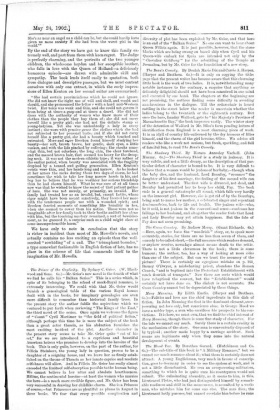The Prince of the Captivity. By Sydney C. Grier. (W.
Black- wood and-Sons. Gs.)—Mr. Grier's new novel is the fourth of what we find he calls his "Balkan Series." This is a series which, in spite of its belonging to the school of mock-Royal romance, is extremely interesting. We could wish that Mr. Grier would furnish a genealogical table of the various Royal houses dealt with in the books, for imaginary genealogies are even more difficult to remember than historical family trees. In the present story the author fulfils the aspirations which wo ventured to put forth when reviewing "The Kings of the East," the third novel of the series. Once again we welcome the figure of " Count " Cyril Mortimer to "the field of political fiction," although perhaps this thne he is more the subject of the book than a great actor therein, as his abduction furnishes the most exciting incident of the plot. Another character in the present story seems to take Mr. Grier quite"out of his set:' for we are introduced to a capricious and beautiful American heiress who promises to develop into the heroine of the book. This is only guile, however, on the part of the author, for Felicia Steinhers, the young lady in question, proves to be a daughter of a reigning house, and we leave her as firmly estab- lished on the throne of Thracia as her innate caprice and resolute selfishness will allow. And in Felicia Mr. Grier has really almost exceeded the limits of self-absorption possible to the human being. We cannot believe in her utter and absolute heartlessness. Helene; the sentimental heroine—at least the woman who marries the hero—is a much more credible figure, and Mr. Grier has been very successful in drawing her childlike charm. She is a Princess of course,—hut Princesses are as plentiful as plums in August in these -books. We fear that every -possible complication and
diversity of plot has been exploited by Mr. Grier, and that here is an end of the "Balkan Series." No one can want to hear about Queen Felicia again. It is just possible, however, that the stone blocks which are being swung on board ship when Cyril and his Queen-wife embark for Syria are intended not only by the "Chevalier Goldberg" for the rebuilding of the Temple at Jerusalem, but by Mr. Grier for the foundation of a new story.






































 Previous page
Previous page